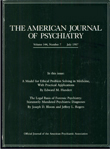Willie: Raising and Loving a Child With Attention Deficit Disorder
It is very difficult to write a book for the lay public that professionals will also find acceptable and useful. The task is difficult for any layperson and even more problematic for the parent of a child with a psychiatric disorder. Writing such a book is often complicated by a parent's natural confusion and emotions surrounding the nature of a child's mental illness or emotional disorder, the diagnostic process, and the trials and tribulations of a successful or unsuccessful treatment process. Ann Colin, a former features editor of McCall's magazine, manages to communicate her own feelings as the mother of a child with the diagnosis of attention deficit disorder with a minimum of bias. At the same time, she shares her exasperation, annoyance, and frustration with obtaining the proper diagnosis, therapy, and education for a young child with this disorder.
Ms. Colin began to keep a journal of daily events and her reactions to them early in the development of her son Willie. Her love, care, and compassion for this challenging child are evident in Willie. She details her attempts to write a novel while Willie was an infant and her frustration with this creative challenge because of her child's illness and the time and attention necessary to attend doctors' appointments with him and then to help “work” with Willie in his therapy. Ms. Colin recounts the challenges she, her husband, Willie, and her second young son faced as they made the rounds from psychiatrist to psychologist to neurologist to psychologist to psychiatrist seeking a correct diagnosis and treatment plan for Willie. She documents the sensitivities and insensitivities of the professionals involved in Willie's treatment. Ms. Colin does not spare herself when she describes ignorance and insensitivity. However, the trials and travails of diagnosis and treatment represented a marathon that ended with a therapeutic triumph. The child who screams, kicks, yells, and hits, who is frustrated, easily distracted, and overly excitable, ultimately responds to the parental care and attention lavished on him, a successful therapeutic process, and an understanding school.
This book will be helpful to families muddling through and trying to do their best for a challenging child. Ms. Colin documents her fears, her terror, and ultimately the family's triumph in a caring, compassionate, and sensitive manner.



